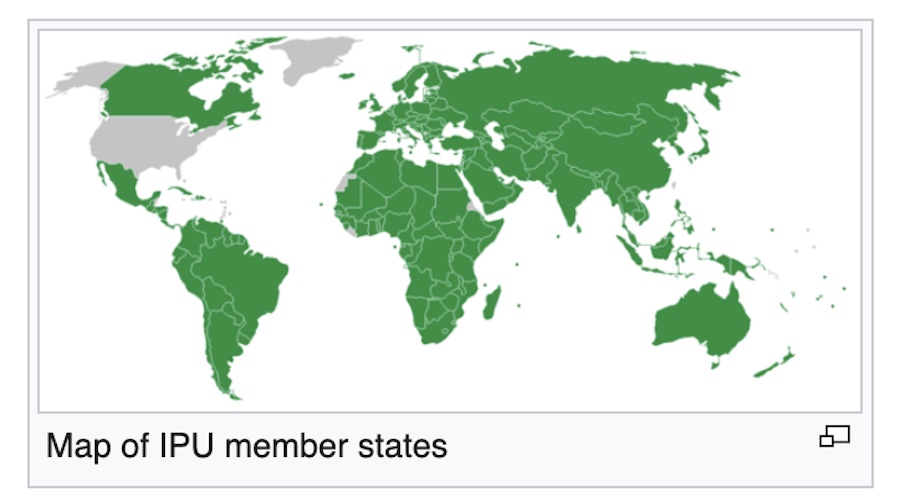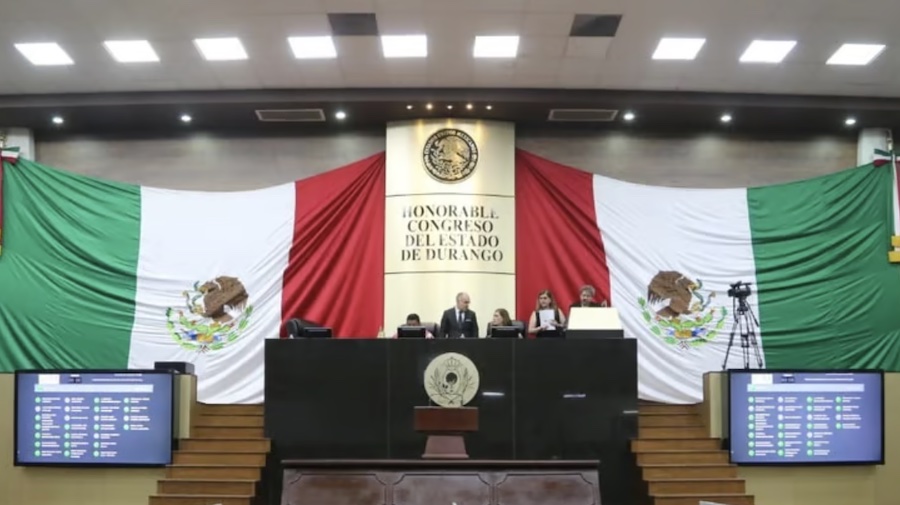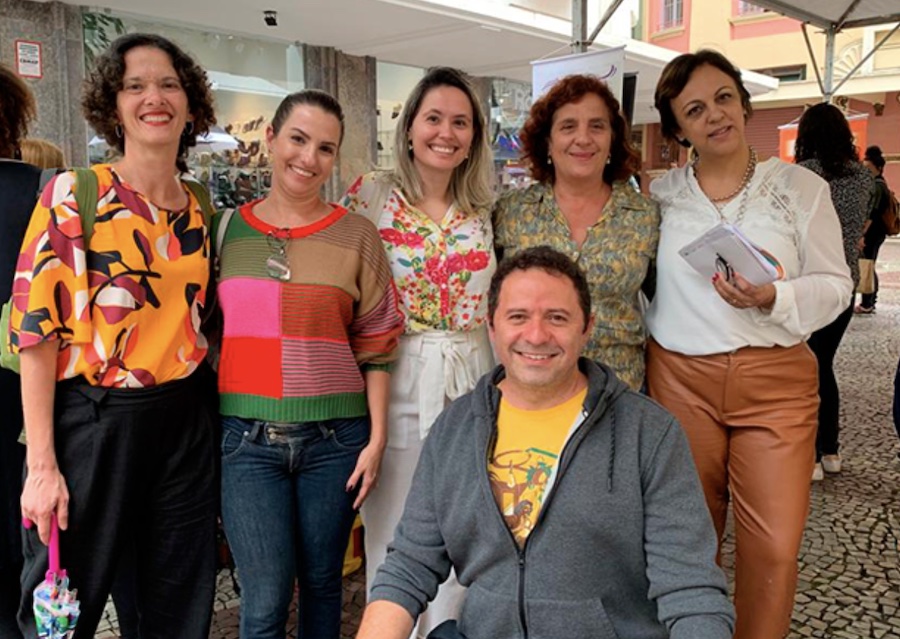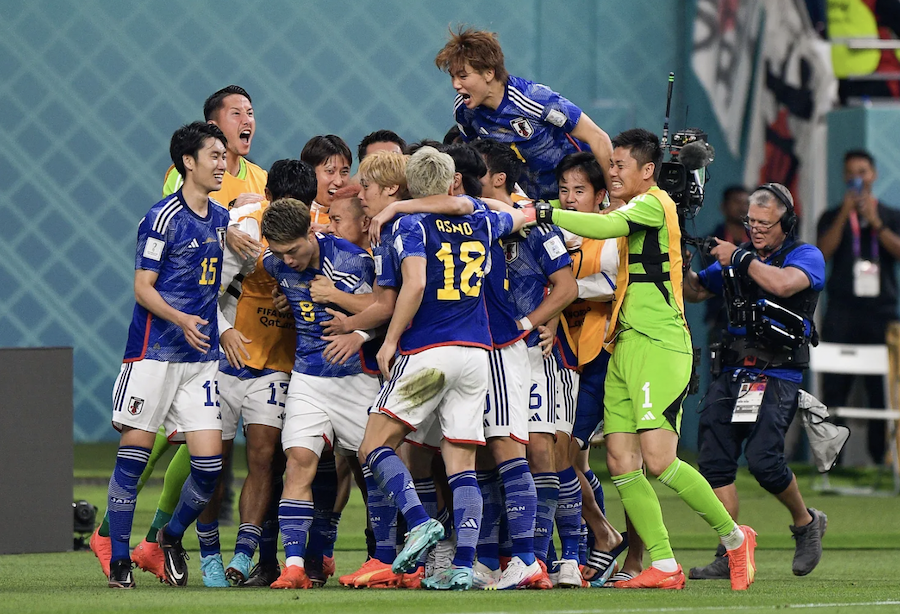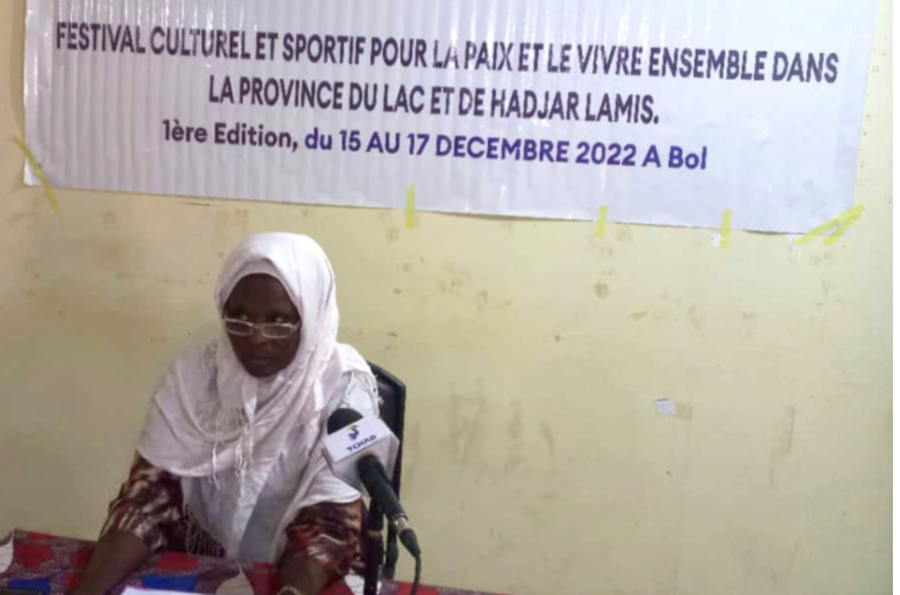. DEMOCRATIC PARTICIPATION .
The inauguration speech of President Luiz Inácio Lula da Silva reprinted by Progressive International (translation by Progressive International
My gratitude to you who faced political violence before, during, and after the electoral campaign, who occupied the social networks and took to the streets under sun and rain, even if it was only to win a single precious vote. Who had the courage to wear our shirt, and, at the same time, wave the Brazilian flag when a violent and anti-democratic minority tried to censor our colors and appropriate the green and yellow that belongs to all Brazilian people. To you, who came from all corners of this country, from near or far away, by plane, by bus, by car or in the back of a truck, by motorcycle, by bicycle, and even on foot, in a true caravan of hope for this celebration of democracy.
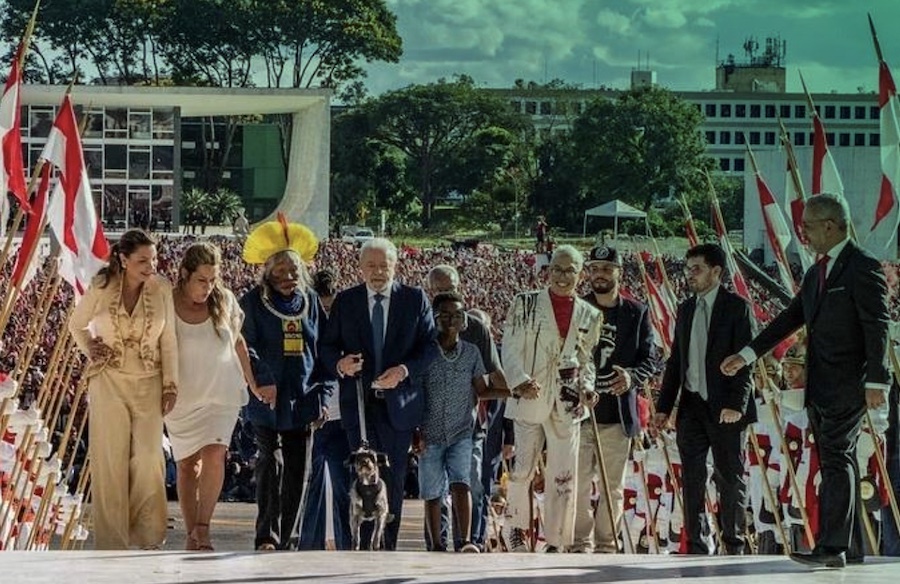
But I also want to address those who opted for other candidates. I will govern for 215 million Brazilians, and not only for those who voted for me. I will govern for all, looking to our bright common future and not through the rear view mirror of a past of division and intolerance. Nobody is interested in a country on a permanent war footing, or a family living in disharmony. It is time to reconnect with friends and family, bonds broken by hate speech and the dissemination of so many lies. Enough of hate, fake news, guns and bombs. Our people want peace to work, study, take care of their families, and be happy. The electoral dispute is over.
I repeat what I said in my speech after the victory on October 30th, about the need to unite the country. There are not two Brazils. We are a single country, a single people, a great nation. We are all Brazilians, and we share the same virtue. We never give up. Even if they pluck all our flowers, one by one, petal by petal, we know that it is always time to replant, and that spring will come, and spring has already arrived. Today joy takes hold of Brazil in arms with hope.
My dear friends, I recently reread the speech of my first inauguration as President in 2003, and what I read made it even more evident how far Brazil has gone backwards. On that first January 2003, here in this very place, my dear vice-president José Alencar and I made the commitment to recover the dignity and self-esteem of the Brazilian people. And we did. Of investing to improve the living conditions of those who need it most, and we did. Of caring for health and education, and we did. But the main commitment we took on in 2003 was to fight inequality and extreme poverty, and to guarantee to every person in this country the right to have breakfast, lunch, and dinner every single day, and we fulfilled this commitment, we put an end to hunger and misery, and we strongly reduced inequality.
Unfortunately, today, 20 years later, we are returning to a past that we thought was buried. Much of what we did was undone in an irresponsible and criminal way. Inequality and extreme poverty are back on the rise. Hunger is back, and not by force of fate, not by the work of nature nor by divine will, hunger. The return of hunger is a crime, the most serious of all crimes committed against the Brazilian people. Hunger is the daughter of inequality, which is the mother of the great evils that delay the development of Brazil. Inequality belittles our continental-sized country by dividing it into unrecognizable parts. On one side a small portion of the population that has everything, on the other side a multitude that lacks everything and a middle class that has been growing poorer year by year due to the injustices of the government. Together we are strong, divided we will always be the country of the future that never arrives and that lives in permanent debt with its people. If we want to build our future today, if we want to live in a fully developed country for everyone, there can be no room for so much inequality. Brazil is great, but the real greatness of a country lies in the happiness of its people, and nobody is really happy in the midst of so much inequality.
My friends, when I say govern, I mean to take care. More than governing, I will take care of this country and the Brazilian people with great affection. In the last few years Brazil has gone back to being one of the most unequal countries in the world. It has been a long time since we have seen such abandonment and discouragement in the streets. Mothers digging through the garbage in search of food for their children. Entire families sleeping outdoors, facing the cold, the rain, and the fear. Children selling candy or begging when they should be in school, living the full childhood they have a right to. Unemployed men and women workers, exhibiting at the traffic lights cardboard signs with the phrase that embarrasses us all: “Please help me”. Queues at the door of butcher shops in search of bones to alleviate hunger, and, at the same time, waiting lines to buy imported cars and private jets. Such a social abyss is an obstacle to the construction of a truly fair and democratic society and a modern and prosperous economy.
That is why I and my vice-president Geraldo Alckmin assume today, before you and all the Brazilian people, the commitment to fight day and night against all forms of inequality in our country. Inequality of income, gender and race inequality, inequality in the labor market, in political representation, in State careers, inequality in access to health, education, and other public services. Inequality between the child who goes to the best private school and the child who shines shoes in the bus station with no school and no future, between the child who is happy with the toy he just got as a present and the child who cries of hunger on Christmas night. Inequality between those who throw food away and those who only eat leftovers. It is unacceptable that the richest 5% of people in this country have the same income share as the other 95%. That six Brazilian billionaires have a wealth equivalent to the assets of the 100 million poorest people in the country. That a worker earning a minimum monthly wage takes 19 years to receive the equivalent of what a super-rich person receives in a single month. And there is no point in rolling up the windows of a luxury car to avoid seeing our brothers and sisters who are crowded under the viaducts, lacking everything. The reality is there on every corner.
My friends, it is unacceptable that we continue to live with prejudice, discrimination, and racism. We are a people of many colors and all of us must have the same rights and opportunities. No one will be a second-class citizen, no one will have more or less support from the State, no one will be obliged to face more or less obstacles just because of the color of their skin. That is why we are recreating the Ministry of Racial Equality, to bury the tragic legacy of our slaveholding past. The indigenous peoples need to have their lands demarcated and free of threats from illegal and predatory economic activities, they need to have their culture preserved, their dignity respected, and sustainability guaranteed. They are not obstacles to development. They are guardians of our rivers and forests and a fundamental part of our greatness as a nation. This is why we are creating the Ministry of Indigenous Peoples to combat 500 years of inequality. We cannot continue to live with the hateful oppression imposed on women, subjected daily to violence in the streets and inside their own homes. It is unacceptable that they continue to receive lower salaries than men, when in the exercise of the same function they need to conquer more and more space in the dissuasive instances of this country, in politics, in the economy, in all strategic areas. Women must be what they want to be, they must be where they want to be. That is why we are bringing back the Ministry of Women. It was to fight inequality and its sequels that we won the election. And this will be the great mark of our government, from this fundamental fight a transformed country will emerge, a great and prosperous country, strong and fair, a country of all by all and for all, a generous and solidary country that will leave no one behind.
(Continued in right column)
(Click here for the article in Portuguese.)
Questions related to this article:
Latin America, has it taken the lead in the struggle for a culture of peace?
(Continued from left column)
My dear comrades, I reassume the commitment to take care of all Brazilians, especially those who need it most, to end hunger in this country once again, to take the poor out of the bone line and put them back in the Union’s budget. We have an immense legacy still vivid in the memory of each and every Brazilian, beneficiary or not of the public policies that made a revolution in this country. But we are not interested in living in the past. Therefore, far from any nostalgia, our legacy will always be the mirror of the future that we will build for this country. Under our governments, Brazil has reconciled record economic growth with the greatest social inclusion in history, and has become the sixth largest economy in the world, at the same time in which 36 million Brazilians have been lifted out of extreme poverty, and we have generated more than 20 million jobs with signed work cards and all rights guaranteed. We adjusted the minimum wage always above inflation. We broke records of investment in education, from kindergarten to university, to make Brazil also an exporter of intelligence and knowledge, and not only an exporter of commodities and raw materials. We more than doubled the number of students in higher education and opened the door to universities for the poor youth of this country. Young whites, blacks, and indigenous people for whom a university degree was an unattainable dream became doctors. We fought one of the great focuses of inequality, access to health, because the right to life cannot be held hostage to the amount of money one has in the bank. We created the Farmácia Popular (Popular Pharmacy), which provided medicines to those who needed them most, and more than that, which brought care to about 60 million Brazilians in the outskirts of the big cities and in the most remote parts of Brazil. We created Smiling Brazil to care for the oral health of all Brazilians. We have strengthened our Single Health System. And I want to take the opportunity to make a special thanks to the SUS professionals for the great work during the pandemic, bravely facing a virus, a lethal virus, and an irresponsible and inhumane government.
In our governments we invested in family agriculture and in small and medium farmers, responsible for 70% of the food that reaches our tables, and we did this without neglecting agribusiness, which obtained investment in record harvests year after year. We took concrete measures to combat climate change and reduced the deforestation of the Amazon by more than 80%. Brazil has consolidated itself as a world reference in the fight against inequality and hunger, and has become internationally respected for its active and haughty foreign policy. We were able to accomplish all of this while taking care of the country’s finances with total responsibility; we were never irresponsible with public money. We have made fiscal surplus every year, eliminated the foreign debt, accumulated reserves of 370 billion dollars, and reduced the foreign debt to almost half of what it was when we took office. In our governments there has never been and never will be any unnecessary spending. We have always invested and will invest again in our most precious asset, which is the Brazilian people.
Unfortunately, much of what we built in 13 years was destroyed in less than half of this time. First by the coup against President Dilma in 2016, and then by the four years of a government of national destruction whose legacy history will never forgive: 700,000 Brazilians killed by covid-19, 125 million suffering some degree of food insecurity from moderate to very severe, and 33 million going hungry. These are just a few numbers that are actually not just numbers, statistics, and indicators. They are people, men, women and children who are victims of a misgovernment that was finally defeated by the people on the historic October 30, 2022. The technical groups of the transition cabinet coordinated by my vice-president Alckmin, who for two months delved into the entrails of the previous government, have brought to light the real dimension of the tragedy.
What the Brazilian people have suffered in the last few years has been the slow and progressive construction of a true genocide. I want to quote, as an example, a small excerpt from the one hundred pages of this true chaos report produced by the transition cabinet. The report says: Brazil has broken feminicide records. Racial equality policies have suffered severe setbacks. Youth policy was dismantled and indigenous rights have never been so violated in the recent history of the country. The textbooks that will be used in the 2023 school year have not yet begun to be published. There is a shortage of medicine at the popular pharmacy, and no stock of vaccines to confront the new variants of covid-19. There is a lack of resources for the purchase of school meals. Universities run the risk of not finishing the school year. There are no resources for Civil Defense and the prevention of accidents and disasters. And who is paying the bill for this blackout is, once again, the Brazilian people.
My friends, these last few years we have lived through, without a doubt, one of the worst periods of our history, an era of shadows, uncertainties and a lot of suffering. But this nightmare came to an end through the sovereign vote in the most important election since the re-democratization of the country. An election that demonstrated the commitment of the Brazilian people to democracy and its institutions. This extraordinary victory for democracy forces us to look forward and forget our differences, which are much smaller than what unites us forever: the love for Brazil and the unshakeable faith in our people.
Now is the time to rekindle the flame of hope, solidarity, and love for our neighbor. Now is the time to take care of Brazil and the Brazilian people again, generate jobs, readjust the minimum wage above inflation, lower the price of food, create even more vacancies in universities, invest heavily in health, education, science and culture. Resume the infrastructure works of Minha Casa, Minha Vida, abandoned by the neglect of the government that is now gone. It is time to bring in investments and reindustrialize Brazil, fight climate change again and put an end once and for all to the devastation of our biomes, especially our beloved Amazon. We must break away from international isolation and resume relations with all the countries of the world. This is no time for sterile resentments. Now is the time for Brazil to look forward and smile again. Let us turn this page and write together a new and decisive chapter in our history.
Our common challenge is to create a fair, inclusive, sustainable and creative, democratic and sovereign country for all Brazilians. I have made a point of saying throughout the campaign: Brazil is resilient. And I say it again with all conviction, even in the face of the picture of destruction revealed by the transition cabinet: Brazil is resilient. It depends on us, all of us. And we will rebuild this country.
In my four years in office, we will work every day for Brazil to overcome the backwardness of more than 350 years of slavery, to recover the time and opportunities lost in these last years, to regain its prominent place in the world, and for each and every Brazilian to have the right to dream again and the opportunities to realize what they dream of. We need all together to rebuild and transform our beloved country. But we will only really rebuild and transform this country if we fight with all our strength against everything that makes it so unequal. It is urgent and necessary to form a broad front against inequality that involves society as a whole, workers, entrepreneurs, artists, intellectuals, governors, mayors, deputies, senators, unions, social movements, class associations, public servants, liberal professionals, religious leaders, ordinary citizens. After all, it is time to unite and rebuild our country. That is why I make this call to all Brazilians who want a more just, solidary, and democratic Brazil. Join us in a great collective effort against inequality. I want to end by asking each and every one of you that the joy of today be the raw material of the fight of tomorrow and of all the days to come, that the hope of today ferments the bread that is to be shared among all, and that we are always ready to react in peace and order to any attacks from extremists who want to sabotage and destroy our democracy. In the fight for the good of Brazil we will use the weapons that our adversaries fear the most, the truth that has overcome the lie, the hope that has overcome fear, and the love that has defeated hatred. Long live Brazil and long live the Brazilian people!


